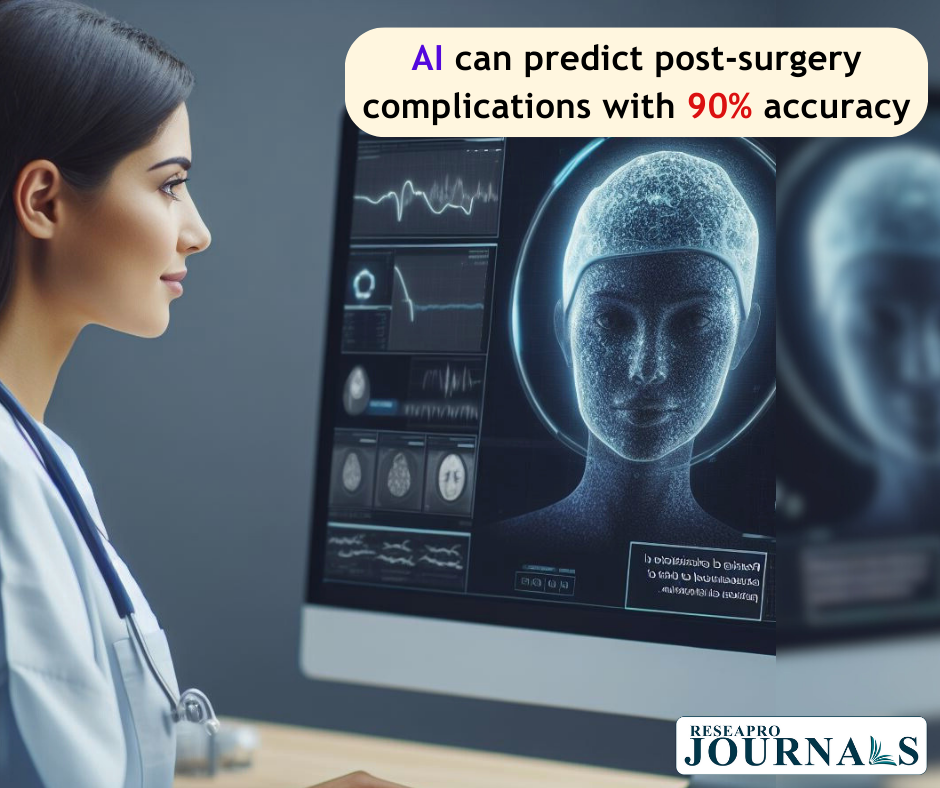|
Getting your Trinity Audio player ready...
|
How Artificial Intelligence is Revolutionizing Post-Operative Care
Artificial intelligence (AI) has become a game-changer across various industries, and its impact on healthcare is becoming increasingly significant. A recent study published in JAMA Network Open has demonstrated AI’s immense potential in predicting post-operative complications with remarkable accuracy. According to the study, AI models can forecast post-surgery issues with 90% accuracy, a substantial improvement compared to traditional methods, which typically achieve around 60-70% accuracy.
This breakthrough could revolutionize post-operative care, enabling healthcare providers to better identify high-risk patients and customize treatment plans to improve patient outcomes. In this post, we’ll explore the findings of the study, how AI models were trained, and the broader implications of AI for post-operative care.
The Study: AI Outperforms Traditional Methods
The JAMA Network Open study involved the analysis of data from 100,000 surgical patients. The goal was to develop an AI model capable of identifying patterns that indicate a higher likelihood of complications after surgery. Traditional methods for predicting post-operative issues often rely on patient histories, demographics, and surgeon experience. While these factors are important, they are often insufficient for accurately assessing risk due to the complexity of surgical procedures and the variety of patient responses.
In contrast, AI models have the advantage of processing vast amounts of data at high speed, enabling them to detect subtle patterns that may go unnoticed by human evaluators. By analyzing historical data from thousands of patients, the AI system was trained to recognize risk factors and signals linked to post-operative complications. As a result, the AI model achieved a 90% prediction accuracy, far surpassing traditional methods that operate within a 60-70% accuracy range.
How AI Models Were Trained for Post-Operative Predictions
Training an AI model to predict post-operative complications requires a comprehensive approach to data collection and analysis. The study utilized a large dataset of 100,000 surgical patients, including information on patient demographics, medical history, type of surgery, intraoperative details, and previous complications.
The AI system was then “trained” using this dataset, allowing it to learn from the relationships between different factors and post-operative outcomes. Over time, the AI model became more proficient at predicting complications by identifying combinations of risk factors that correlate with post-surgery issues.
For example, factors such as age, pre-existing conditions, or the length of the surgery might indicate a higher risk for certain complications like infections, bleeding, or delayed recovery. The AI can flag these cases, allowing doctors to intervene sooner or closely monitor patients who are more likely to encounter problems during recovery.
Impact on Patient Care: More Personalized Treatment
One of the most promising aspects of AI in post-operative care is its potential to personalize treatment. Traditional risk assessments provide general guidelines that apply broadly to most patients, but they may miss important nuances that are specific to individual cases. By contrast, AI-driven models can analyze a wide array of patient-specific data to offer a more tailored approach to post-operative care.
For example, an AI system could identify high-risk patients who would benefit from closer post-surgical monitoring. It could also suggest custom treatment plans for patients likely to experience complications, ensuring that healthcare providers can intervene before small issues become major problems.
In cases where complications do arise, AI can assist in real-time, suggesting immediate interventions based on the patient’s condition and known risks. This proactive approach has the potential to significantly reduce mortality rates, improve recovery times, and enhance the overall quality of care.
AI’s Broader Implications for Healthcare
The ability of AI to transform post-operative care is part of a broader trend toward AI-driven healthcare systems. By processing enormous datasets, AI models can detect trends and risk factors faster and more accurately than traditional methods. This technology has applications beyond surgery, including:
– Early disease detection: AI can analyze medical images, lab results, and patient histories to detect diseases like cancer at an earlier stage, leading to better treatment outcomes.
– Medication management: AI can assist in prescribing medications based on patient history and real-time responses, reducing the risk of adverse reactions or drug interactions.
– Remote patient monitoring: Wearable devices powered by AI algorithms can monitor vital signs and alert healthcare providers to changes in a patient’s condition, even after they’ve left the hospital.
In addition to improving patient outcomes, AI can also alleviate the workload of healthcare providers, allowing them to focus more on patient care rather than data analysis.
Challenges and Ethical Considerations
While the potential of AI in healthcare is enormous, there are several challenges and ethical considerations that need to be addressed. Data privacy is one major concern. AI systems require access to vast amounts of sensitive patient data, and ensuring that this data is protected from breaches or misuse is critical. Additionally, AI models must be transparent and explainable. Healthcare providers need to understand how the AI arrives at its predictions so they can trust and verify the recommendations. There is also the potential for bias in AI models if the data they are trained on is not representative of all patient populations.
Conclusion
The study from JAMA Network Open highlights the transformative role of AI in post-operative care, showcasing its ability to predict complications with 90% accuracy. This leap in accuracy from traditional methods (60-70%) has the potential to enhance patient care, personalize treatment plans, and reduce the risk of post-operative issues. As AI continues to advance, its role in healthcare will undoubtedly expand, offering more precise, efficient, and tailored medical solutions for patients worldwide. With proper ethical guidelines in place, AI could be the key to a future where healthcare is not only more accurate but also more accessible and efficient.




